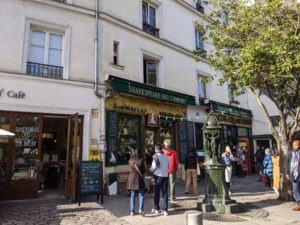A woman and her baby daughter come to Paris to help a friend close her English-language bookstore. The bookstore is in an Orthodox Jewish neighborhood, as is the apartment the woman has rented. She becomes friends with a rabbi who frequents the store. None of the three are given names in this Helen Schulman story on Kenyon Review.
The mother of the baby is the “The Shabbos Goy,” the title of the story. Because she lives across from the shul and is a Gentile, she becomes the one who handles money, turn lights off and on for Jews who can’t do those things on Shabbos. The rabbi provides recent history:
“…when Al Gore and Joseph Lieberman were in the American Senate, Lieberman, who is shomer Shabbat, would sleep on his couch in his office before Saturday votes, and Gore would turn off the lights for him. Your general, your Colin Powell…leant such a caring hand to a Jewish neighbor. He ended up fluent in Yiddish. Even the president of the United States”—here the rabbi could not wring the pride out of his gentle voice—“President Obama, did such charitable acts as a young man, with loving kindness in his heart.”
The rabbi quotes, “sometimes it is necessary to reteach a thing its loveliness,” and the Shabbos Goy replies, “Kinnell. Are you even allowed to like that poem? It’s so Catholic,” then adds to the quote herself: “to put a hand on its brow of the flower and retell it in words and in touch it is lovely.”
Schulman doesn’t bother with line breaks but mentions the title. I pulled Galway Kinnell from my shelves, found “St. Francis and the Sow” in a book I had not remembered I got him to sign at a reading here in Denver, so long ago, the same reading at which my friend Kathleen Cain spoke to him in Irish and he smiled, “Ah, it’s been so long since I’ve heard that.”
The rabbi picks up a copy of Jane Kenyon’s translations of Anna Akhmatova’s poems. It takes a poet to translate poetry and Kenyon was the right poet to translate Akhmatova. The rabbi has Akhmatova in Russian, his first language, but wants to read Kenyon’s translations, admires her poetry as well. He finds literature a place for healing and hope, recites: “sometimes the sound of the dog’s breathing saves my life,” and the woman says when she read that poem of Kenyon’s she adopted a puppy, but like her husband, it didn’t last long.
Jane Kenyon is also on my shelf. The Shabbos Goy says she’s one of her favorite sad poets, but I’ve always found Kenyon’s melancholy hopeful and comforting. Schulman has taken liberties. The poem series is “Having it Out with Melancholy.” The one the rabbi misquotes is number six of nine poems:
6. In and Out
The dog searches until he finds me/upstairs, lies down with a clatter/of elbows, puts his head on my foot.
Sometimes the sound of his breathing/saves my life—in and out, in and out; a pause, a long sigh…
The Shabbos Goy, also melancholy, is becoming hopeful, finding purpose in her work for the bookstore and the rabbi, rediscovering the truth of his contention that literature has the power to heal. But the rabbi suffers antisemitic attacks on the street, as do his wife and children. No longer feeling safe in Paris, he takes a post at a synagogue in Miami. I get it. But giving up Paris for Miami is a high price to pay.
Besides being annoyed about no-name characters, I’m annoyed that the friend’s bookstore is called the last English-language store in Paris besides Shakespeare & Co. San Francisco Book Company is alive and well on the Left Bank, a block from the tiny storefront that was Shakespeare & Co’s original home. My husband bought two books at San Francisco Book Company last fall. Though tempted by a collection of Auden, I was too jetlagged for poetry that day.
I wonder if things are really so bad for Jews in Paris. We loved our time there last October. But on the evening Phil and I went to the mall across from our hotel to buy gifts, there was a Jewish service in the mall’s attached arena, men in yarmulkes, families streaming into the cavernous hall. At the street entrances and the doors to the arena itself, gendarmes in riot gear were posted, tense and watchful, just as they are outside the synagogue in Schulman’s fiction.
Schulman created her nameless characters of course, created the wry humor, the whole story, except for those fine quotes that made me lonesome for poetry, for how a poem, the right poem at the right time, can help and heal.
Both the Shabbos Goy and the rabbi also cite Dickinson. “Pain has an element of blank” is what the woman recalls, going through her divorce. But the rabbi remembers “Hope is the thing with feathers.”
Schulman’s story here:



Beautiful meditation and modeling of deep reading—following hints to Kinnell, Kenyon, Dickinson and more. No good piece of writing exists n isolation, nor do we when we read into its roots. I’m just now finishing “The Invented Part,” by Rodrigo Fresán, an Argentine novelist whose characters float in waves of allusions to books, films, TV shows, music, historical events, and the lore surrounding all of it. Fantastic!
Ah, a new book to add to my list: Rodrigo Fresán. Thank you.
Really enjoyed this thoughtful account – and, of course any mention of either Jane Kenyon or San Francisco Book Company, (owned, as you know, by my good friend Jim Carroll, and to which I referred you and Phil – as well as every single friend who goes to Paris), always gets my attention. I’ve long been a Jane Kenyon fan as well – and here’s a little factoid for you. It was at Robert Bly’s suggestion that she took Akhmatova as her personal poetic mentor. Bly was lifelong friends with Jane and Donald Hall, as I’m sure you know.
So enriching to have all that additional background added in where I could not: that 800-word limit comes quickly. But do you share that memory I have of Kinnell’s reading? So long ago, and blurred, but I’m sure it’s true.
Beautiful piece, I will be thinking of you
Sylvia
Thanks, Sylvia, and I’ll try to keep you posted, but will probably not be able to be online for a while.
This one went straight to the heart, Pat. I must pull out my old copy ot Galway Kinnell’s “Body Rags.” And the dog’ s sigh—makes me miss my old Red again. Hope you are well. Hugs to you both.
That was the best thing about that story, that it made me pull poets from the shelves I’d not looked at in years.